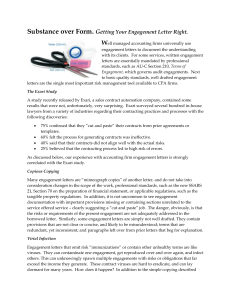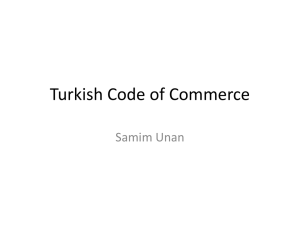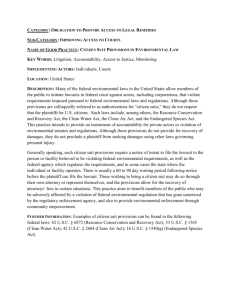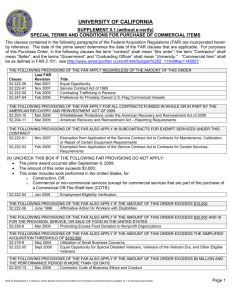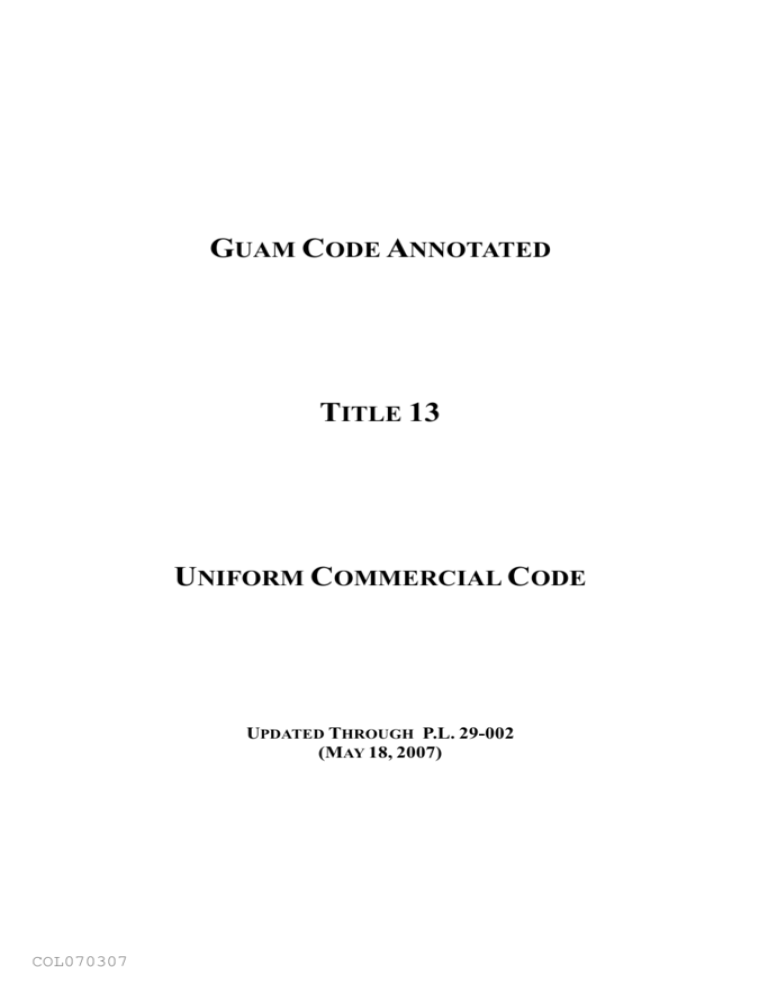
GUAM CODE ANNOTATED
TITLE 13
UNIFORM COMMERCIAL CODE
UPDATED THROUGH P.L. 29-002
(MAY 18, 2007)
COL070307
COL070307
TABLE OF CONTENTS
TITLE 13
UNIFORM COMMERCIAL CODE
Division 1.
General Provisions.
Chapter 1. Short Title, Construction, Application and
Subject Matter of the Code. §§ 1101-1108
Chapter 2. General Definitions and Principles of
Interpretation. '' 1201-1210
Division 2.
Sales.
Chapter 1. Short Title, General Construction and Subject
Matter. §§ 2101-2107
Chapter 2. Form, Formation and Readjustment of Contract.
§§ 2201-2210
Chapter 3. General Obligation and Construction of Contract.
§§ 2301-2328
Chapter 4. Title, Creditors and Good Faith Purchasers.
§§ 2401-2403
Chapter 5. Performance. §§ 2501-2515
Chapter 6. Breach, Repudiation and Excuse. §§ 2601-2616
Chapter 7. Remedies. §§ 2701-2725
Chapter 8. Retail Sales. §§ 2800-2801
Division 3.
Commercial Paper.
Chapter 1. Short Title Form and Interpretation. §§ 3101-3123
Chapter 2. Transfer and Negotiation. §§ 3201-3208
Chapter 3. Rights of a Holder. §§ 3301-3307
Chapter 4. Liability of Parties. §§ 3401-3419
Chapter 5. Presentment, Notice of Dishonor and Protest.
§§ 3501-3511
Chapter 6. Discharge. §§ 3601-3606
Chapter 7. Advice of International Sight Draft. § 3701
Chapter 8. Miscellaneous. §§ 3801-3805
Division 4.
Bank Deposits and Collections.
Chapter 1. General Provisions and Definitions.
§§ 4101-4109
Chapter 2. Collection of Items: Depositary and Collecting Banks.
§§ 4201-4214
Chapter 3. Collection of Items: Payor Banks. §§ 4301-4303
COL070307
Chapter 4. Relationship Between Payor Bank and Its Customer.
§§ 4401-4407
Chapter 5. Collection of Documentary Drafts. §§ 4501-4504
Division 5.
Letters of Credit. §§ 5101-5118
Division 6.
Bulk Transfers. §§ 6101-6111
Division 7.
Warehouse Receipts, Bills of Lading and Other
Documents of Title.
Chapter 1. General. §§ 7101-7105
Chapter 2. Warehouse Receipts: Special Provisions.
§§ 7201-7210
Chapter 3. Bills of Lading: Special Provisions. §§ 7301-7309
Chapter 4. Warehouse Receipts and Bills of Lading: General
Obligations. §§ 7401-7404
Chapter 5. Warehouse Receipts and Bills of Lading: Negotiation
and Transfer. §§ 7501-7509
Chapter 6. Warehouse Receipts and Bill of Lading:
Miscellaneous Provisions. §§ 7601-7603
Division 8.
Investment Securities.
Chapter 1. Short Title and General Matters. §§ 8101-8107
Chapter 2. Issue--Issuer. §§ 8201-8208
Chapter 3. Purchase. §§ 8301-8320
Chapter 4. Registration. §§ 8401-8406
Division 9.
Secured Transactions; Sales of Accounts and Chattel
Paper.
Chapter l. Short Title, Applicability and Definitions.
§§ 9101-9114
Chapter 2. Validity of Security Agreement and Rights of Parties
Thereto. §§ 9201-9208
Chapter 3. Rights of Third Parties; Perfected and Unperfected
Security Interests; Rules of Priority. §§ 9301-9318
Chapter 4. Filing. §§ 9401-9408
Chapter 5. Default. §§ 9501-9508
Division 10. Effective Date and Repealer. §§ 10101-10104.
COL070307
INTRODUCTION
(2005)
The Uniform Commercial Code of Guam was enacted by P.L. 13-160.
The Legislature adopted AThe Uniform Commercial Code of California
commencing with Division I in the form attached subject to the amendments
set forth below. The Code shall include the division, chapter and section
headings in the form indicated but shall not include any tables of contents or
editorial material which is not a part of the California statute.@ (P.L. 13-160,
1)
One hundred seventy-four (174) amendments follow. Most deal with
typographical errors found in the version of the California UCC adopted,
changes to reflect the term AGuam@ instead of ACalifornia@ or Astate@, and
certain substantive amendments which bring the Guam UCC closer to the
Official UCC as promulgated by the Commissioners on Uniform State Laws.
In order to assist the users of this Code, the Guam Law Revision
Commission has prepared its editorial comments on the substantive changes
made in enacting the Guam UCC. These editorial comments, the Index and
the full text of the UCC as adopted on Guam are included in this volume of
the Guam UCC.
Public Law 13-150 repealed those portions of the Guam Codes which
conflicted with the new UCC and which were replaced by it. Those laws
repealed are:
§ 1624(4), Civil Code;
Title I of Part IV of Division Third of the Civil Code
(Uniform Sales Act);
Chapter II of Title II of Part IV of Division Third of the Civil Code;
Article III-A (Uniform Warehouse Receipts Act) of Chapter II of
Title III of Part IV of Division Third of the Civil Code;
Article III of Chapter III of Title VII of Part IV of Division Third of the
Civil Code;
Article V of Chapter II of Title XIII of Part IV of Division Third of the
Civil Code;
COL070307
Article III of Chapter II of Title XIV of Part IV of Division Third of the
Civil Code;
Chapter II-A of Title XIV of Part IV of Division Third of the Civil
Code
Chapter III of Title XIV of Part IV of Division Third of the Civil Code;
§ 3049, Civil Code;
Chapter VII of Title XIV of Part IV of Division Third of the Civil
Code;
Title XV (Bulk Transfers Act) of Part II of Division Fourth of the Civil
Code;
§ 542(4), Code of Civil Procedure;
§ 1973a, Code of Civil Procedure;
§ 30036-30039, Government Code;
§ 30041, Government Code;
§ 30043, Government Code; and
Part E (commencing 30300), Chapter I, Art. III of Title XXXI,
Government Code
§ 30040(b) of the Government Code was amended to read:
@(b) Nothing herein shall be construed to relieve the depositor from the
duty now imposed by law of exercising due diligence in the
examination of such account and vouchers, if any, when rendered by the
bank and of immediate notification to the bank upon discovery of any
error therein, nor from the legal consequences of neglect of such duty;
nor to prevent the application of § 3406 and § 4406 of the Commercial
Code to cases governed thereby.@
Section 22 of P.L. 13-150 provided that laws repealed by that Act were
to remain in effect as provided by § 10102 of the Commercial Code (dealing
with rights and remedies vested or in process at the time of enactment).
Public Law 15-104 codified this UCC as Title 13 of the Guam Code
Annotated.
Public Law 26-172 (Dec. 30, 2002) repealed and reenacted Division 9
to adopt the 2001 Revision of the Article 9 of the Uniform Commercial Code
COL070307
and did not provide an effective date. Public Law 27-40 (Nov. 18, 2003)
amended P.L. 26-172 to add section 5 which made the effective date Oct. 1,
2004. Public Law 27-106 (Sept. 30, 2004) extended the effective date until
Oct. 1, 2005. Public Law 28-067 (Sept. 20, 2005) further extended the
effective date until Oct. 1, 2006. The Division 9 provided below is pre-P.L.
26-172 and is the current version of the law.
COL070307
COL070307
13 GCA UNIFORM COMMERCIAL CODE
DIV. 1 GENERAL PROVISIONS
DIVISION 1
GENERAL PROVISIONS
Chapter 1. Short Title, Construction, Application and Subject Matter of the
Code.
Chapter 2. General Definitions and Principles of Interpretation.
CHAPTER 1
SHORT TITLE, CONSTRUCTION, APPLICATION AND SUBJECT
MATTER OF THE CODE
§ 1101.
§ 1102.
§ 1103.
§ 1104.
§ 1105.
Short Title.
Purposes; Rules of Construction; Variation by Agreement.
Supplementary General Principles of Law Applicable.
Construction Against Implicit Repeal.
Territorial Application of the Act; Parties' Power to Choose
Applicable Law.
§ 1106. Remedies to be Liberally Administered.
§ 1107. Waiver or Renunciation of Claim or Right After Breach.
§ 1108. Severability.
§ 1101. Short Title.
This Code shall be known and may be cited as the Uniform Commercial
Code of Guam.
§ 1102. Purposes; Rules of Construction Variation by Agreement.
(1) This code shall be liberally construed and applied to promote its
underlying purposes and policies.
(2) Underlying purposes and policies of this code are:
(a) To simplify, clarify and modernize the law governing
commercial transactions;
(b) To permit the continued expansion of commercial practices
through custom, usage and agreement of the parties;
(c) To make uniform the law among the various jurisdictions.
9
COL070307
13 GCA UNIFORM COMMERCIAL CODE
DIV. 1 GENERAL PROVISIONS
(3) The effect of provisions of this code may be varied by agreement,
except as otherwise provided in this code and except that the obligations of
good faith, diligence, reasonableness and care prescribed by this code may
not be disclaimed by agreement, but the parties may by agreement determine
the standards by which the performance of such obligations is to be measured if such standards are not manifestly unreasonable.
(4) The presence in certain provisions of this code of the words Aunless
otherwise agreed@ or words of similar import does not imply that the effect
of other provisions may not be varied by agreement under subdivision (3).
(5) In this code unless the context otherwise requires
(a) Words in the singular number include the plural, and in the
plural include the singular;
(b) Words of the masculine gender include the feminine and the
neuter, and when the sense so indicates words of the neuter gender may
refer to any gender.
COMMENT: Part of the Committee Report on Substitute Bill No. 727 (this Act)
states:
@The purpose and effect of Substitute Bill No. 727 is explained more fully in the
Official Comments to the 1972 Official Text of the Uniform Commercial Code and in
the California Code Comments set forth in West's Annotated California Commercial
Code (1964, Supp. 1975) and it is the intent of this Committee that explanatory material
be given due consideration in the interpretation and application of the Guam Code.
(Committee on Commerce, Tourism and Transportation, 13th Guam Legislature, Report
on Substitute Bill No. 727, Attachment #10, pp. 1-2)
§ 1103. Supplementary General Principles of Law Applicable.
Unless displaced by the particular provisions of this code, the principles
of law and equity, including the law merchant and the law relative to
capacity to contract, principal and agent, estoppel, fraud, misrepresentation,
duress, coercion, mistake, bankruptcy, or other validating or invalidating
cause shall supplement its provisions.
§ 1104. Construction Against Implicit Repeal.
This code being a general act intended as a unified coverage of its
subject matter, no part of it shall be deemed to be impliedly repealed by
subsequent legislation if such construction can reasonably be avoided.
§ 1105. Territorial Application of the Act; Parties' Power to Choose
Applicable Law.
10
COL070307
13 GCA UNIFORM COMMERCIAL CODE
DIV. 1 GENERAL PROVISIONS
(1) Except as provided hereafter in this section, when a transaction
bears a reasonable relation to this territory and also to any state or nation the
parties may agree that the law either of this territory or of such other state or
nation shall govern their rights and duties. Failing such agreement this code
applies to transactions bearing an appropriate relation to this territory.
(2) Where one of the following provisions of this code specifies the
applicable law, that provision governs and a contrary agreement is effective
only to the extent permitted by the law (including the conflict of law rules)
so specified:
Rights of creditors against sold goods. § 2402.
Applicability of the division on bank deposits and collections. § 4102.
Bulk transfers subject to the division on bulk transfers. § 6102.
Applicability of the division on investment securities. § 8106.
Perfection provisions of the division on secured transactions. § 9103.
NOTE: The Compiler has deleted references in this Section to Divisions 2A and 4A,
which have not been enacted on Guam.
§ 1106. Remedies to be Liberally Administered.
(1) The remedies provided by this code shall be liberally administered
to the end that the aggrieved party may be put in as good a position as if the
other party had fully performed but neither consequential or special nor
penal damages may be had except as specifically provided in this code or by
other rule of law.
(2) Any right or obligation declared by this code is enforceable by
action unless the provision declaring it specifies a different and limited
effect.
§ 1107. Waiver or Renunciation of Claim or Right After Breach.
Any claim or right arising out of an alleged breach can be discharged in
whole or in part without consideration by a written waiver or renunciation
signed and delivered by the aggrieved party.
§ 1108. Severability.
11
COL070307
13 GCA UNIFORM COMMERCIAL CODE
DIV. 1 GENERAL PROVISIONS
If any provision or clause of this code or application thereof to any
person or circumstances is held invalid, such invalidity shall not affect other
provisions or application of the code which can be given effect without the
invalid provision or application, and to this end the provisions of this code
are declared to be severable.
---------CHAPTER 2
GENERAL DEFINITIONS AND PRINCIPLES OF INTERPRETATION
§ 1201. General Definitions.
§ 1202. Documents Required of Third Party; Admissibility;
Presumptions.
§ 1203. Obligation of Good Faith.
§ 1204. Time; Reasonable Time; ASeasonably@.
§ 1205. Course of Dealing and Usage of Trade.
§ 1206. Statute of Frauds for Kinds of Personal Property not Otherwise
Covered.
§ 1207. Performance or Acceptance Under Reservation of Rights.
§ 1208. Option to Accelerate at Will.
§ 1209. Obligation; Limits of Subordination.
§ 1210. Presumptions Affect Burden of Proof.
§ 1201. General Definitions.
Subject to additional definitions contained in the subsequent Divisions
of this Title which are applicable to specific Divisions or Chapters thereof,
and unless the context otherwise requires, in this Title:
(1) Action in the sense of a judicial proceeding includes recoupment,
counterclaim, setoff, suit in equity and any other proceedings in which rights
are determined.
(2) Aggrieved party means a party entitled to resort to a remedy.
(3) Agreement means the bargain of the parties in fact as found in their
language or by implication from other circumstances including course of
dealing or usage of trade or course of performance as provided in this code
(§ 1205 and § 2208.) Whether an agreement has legal consequences is
12
COL070307
13 GCA UNIFORM COMMERCIAL CODE
DIV. 1 GENERAL PROVISIONS
determined by the provisions of this code, if applicable; otherwise by the law
of contracts (§ 1103.) (Compare contract.)
(4) Bank means any person engaged in the business of banking.
(5) Bearer means the person in possession of an instrument, document
of title or security payable to bearer or indorsed in blank.
(6) Bill of Lading means a document evidencing the receipt of goods for
shipment issued by a person engaged in the business of transporting or
forwarding goods, and which, by its terms, evidences the intention of the
issuer that the person entitled under the document (7403(4)) has the right to
receive, hold and dispose of the document and the goods it covers.
Designation of a document by the issuer as a bill of lading is conclusive
evidence of such intention. Bill of Lading includes an airbill. Airbill means a
document serving for air transportation as a bill of lading does for marine or
rail transportation, and includes an air consignment note or air waybill.
(7) Branch includes a separately incorporated foreign branch of a bank.
(8) Burden of establishing a fact means the burden of persuading the
triers of fact that the existence of the fact is more probable than its
nonexistence.
(9) Buyer in ordinary course of business means a person who in good
faith and without knowledge that the sale to him is in violation of the
ownership rights or security interest of a third party in the goods buys in
ordinary course from a person in the business of selling goods of that kind
but does not include a pawnbroker. All persons who sell minerals or the like
(including oil and gas) at well-head or mineralhead shall be deemed to be
persons in the business of selling goods of that kind. “Buying” may be for
cash or by exchange of other property or on secured or unsecured credit and
includes receiving goods or documents of title under a preexisting contract
for sale but does not include a transfer in bulk or as security for or in total or
partial satisfaction of a money debt.
(10) Conspicuous. A term or clause is conspicuous when it is so written
that a reasonable person against whom it is to operate ought to have noticed
it. A printed heading in capitals (as: NON-NEGOTIABLE BILL OF LADING) is conspicuous. Language in the body of a form is Aconspicuous@ if it is
in larger or other contrasting type or color. But in a telegram any stated term
13
COL070307
13 GCA UNIFORM COMMERCIAL CODE
DIV. 1 GENERAL PROVISIONS
is Aconspicuous.@ Whether a term or clause is Aconspicuous@ or not is for
decision by the court.
(11) Contract means the total legal obligation which results from the
parties' agreement as affected by this code and any other applicable rules of
law. (Compare AAgreement.@)
(12) Creditor includes a general creditor, a secured creditor, a lien
creditor and any representative of creditors, including an assignee for the
benefit of creditors, a trustee in bankruptcy, a receiver in equity and an
executor or administrator of an insolvent debtor's or assignor's estate.
(13) Defendant includes a person in the position of defendant in a crossaction or counterclaim.
(14) Delivery with respect to instruments, documents of title, chattel
paper or securities means voluntary transfer of possession.
(15) Document of title includes bill of lading, dock warrant, dock
receipt, warehouse receipt, gin ticket, compress receipt, and also any other
document which in the regular course of business or financing is treated as
adequately evidencing that the person entitled under the document (§
7403(4)) has the right to receive, hold and dispose of the document and the
goods it covers. To be a document of title, a document must purport to be
issued by a bailee and purport to cover goods in the bailee's possession
which are either identified or are fungible portions of an identified mass.
(16) Fault means wrongful act, omission or breach.
(17) Fungible with respect to goods or securities means goods or
securities of which any unit is, by nature or usage of trade, the equivalent of
any other like unit. Goods which are not fungible shall be deemed fungible
for the purposes of this code to the extent that under a particular agreement
or document unlike units are treated as equivalents.
(18) Genuine means free of forging or counterfeiting.
(19) Good faith means honesty in fact in the conduct or transaction
concerned.
(20) Holder means a person who is in possession of a document of title
or an instrument or an investment security drawn, issued or indorsed to him
or to his order or to bearer or in blank.
14
COL070307
13 GCA UNIFORM COMMERCIAL CODE
DIV. 1 GENERAL PROVISIONS
(21) To honor is to pay or to accept and pay, or where a credit so
engages to purchase or discount a draft complying with the terms of the
credit.
(22) Insolvency proceedings includes any assignment for the benefit of
creditors or other proceedings intended to liquidate or rehabilitate the estate
of the person involved.
(23) A person is insolvent who either has ceased to pay his debts in the
ordinary course of business or cannot pay his debts as they become due or is
insolvent within the meaning of the federal bankruptcy law.
(24) Money means a medium of exchange authorized or adopted by a
domestic or foreign government as a part of its currency.
(25) A person has notice of a fact when:
(a) He has actual knowledge of it; or
(b) He has received notice or notification of it; or
(c) From all the facts and circumstances known to him at the time
in question he has reason to know that it exists. A person knows or has
knowledge of a fact when he has actual knowledge of it. Discover or
learn or a word or phrase of similar import refers to knowledge rather
than to reason to know. The time and circumstances under which a
notice or notification may cease to be effective are not determined by
this code.
(26) A person notifies or gives a notice or notification to another by
taking such steps as may be reasonably required to inform the other in
ordinary course whether or not such other actually comes to know of it. A
person receives a notice or notification when:
(a) It comes to his attention; or
(b) It is duly delivered at the place of business through which the
contract was made or at any other place held out by him as the place for
receipt of such communications.
(27) Notice, knowledge or a notice or notification received by an
organization is effective for a particular transaction from the time when it is
brought to the attention of the individual conducting that transaction, and in
any event from the time when it would have been brought to his attention if
the organization had exercised due diligence. An organization exercises due
15
COL070307
13 GCA UNIFORM COMMERCIAL CODE
DIV. 1 GENERAL PROVISIONS
diligence if it maintains reasonable routines for communicating significant
information to the person conducting the transaction and there is reasonable
compliance with the routines. Due diligence does not require an individual
acting for the organization to communicate information unless such communication is part of his regular duties or unless he has reason to know of the
transaction and that the transaction would be materially affected by the
information.
(28) Organization includes a corporation, government or governmental
subdivision or agency, business trust, estate, trust, partnership or association,
two or more persons having a joint or common interest, or any other legal or
commercial entity.
(29) Party, as distinct from Athird party,@ means a person who has
engaged in a transaction or made an agreement within this division.
(30) Person includes an individual or an organization. (See Section
1102.)
(31) Purchase includes taking by sale, discount negotiation, mortgage,
pledge, lien, issue or reissue, gift or any other voluntary transaction creating
an interest in property.
(32) Purchaser means a person who takes by purchase.
(33) Remedy means any remedial right to which an aggrieved party is
entitled with or without resort to a tribunal.
(34) Representative includes an agent, an officer of a corporation or
association, and a trustee, executor or administrator of an estate, or any other
person empowered to act for another.
(35) Rights includes remedies.
(36) Security interest means an interest in personal property or fixtures
which secures payment or performance of an obligation. The retention or
reservation of title by a seller of goods notwithstanding shipment or delivery
to the buyer (Section 2401) is limited in effect to a reservation of a “security
interest.” The term also includes any interest of a buyer of accounts or
chattel paper, which is subject to Division 9. The special property interest of
a buyer of goods on identification of such goods to a contract for sale under
Section 2501 is not a “security interest,” but a buyer may also acquire a
“security interest” by complying with Division 9. Unless a lease or
consignment is intended as security, reservation of title thereunder is not a
16
COL070307
13 GCA UNIFORM COMMERCIAL CODE
DIV. 1 GENERAL PROVISIONS
“security interest” but a consignment is in any event subject to the provisions
on consignment sales (Section 2326.) Whether a lease is intended as security
is to be determined by the facts of each case; however, (a) the inclusion of an
option to purchase does not of itself make the lease one intended for security,
and (b) an agreement that upon compliance with the terms of the lease the
lessee shall become or has the option to become the owner of the property
for no additional consideration or for a nominal consideration does make the
lease one intended for security.
(37) Send in connection with any writing or notice means to deposit in
the mail or deliver for transmission by any other usual means of communication with postage or cost of transmission provided for and properly
addressed and in the case of an instrument to an address specified thereon or
otherwise agreed, or if there be none to any address reasonable under the
circumstances. The receipt of any writing or notice within the time at which
it would have arrived if properly sent has the effect of a proper sending.
When a writing or notice is required to be sent by registered or certified
mail, proof of mailing is sufficient, and proof of receipt by the addressee is
not required unless the words Awith return receipt requested@ are also used.
(38) Signed includes any symbol executed or adopted by a party with
present intention to authenticate a writing.
(39) Surety includes guarantor.
(40) Telegram includes a message transmitted by radio, teletype, cable,
any mechanical method of transmission, or the like.
(41) Term means that portion of an agreement which relates to a
particular matter.
(42) Unauthorized signature or indorsement means one made without
actual, implied or apparent authority and includes a forgery.
(43) Value. Except as otherwise provided with respect to negotiable
instruments and bank collections (Sections 3303, 4208 and 4209) a person
gives Avalue@ for rights if he acquires them:
(a) In return for a binding commitment to extend credit or for the
extension of immediately available credit whether or not drawn upon
and whether or not a chargeback is provided for in the event of
difficulties in collection; or
17
COL070307
13 GCA UNIFORM COMMERCIAL CODE
DIV. 1 GENERAL PROVISIONS
(b) As security for or in total or partial satisfaction of a pre-existing
claim; or
(c) By accepting delivery pursuant to a pre-existing contract for
purchase; or
(d) Generally, in return for any consideration sufficient to support a
simple contract.
(44) Warehouse receipt means a document evidencing the receipt of
goods for storage issued by a warehouseman (Section 7102), and which, by
its terms, evidences the intention of the issuer that the person entitled under
the document (Section 7403(4)) has the right to receive, hold and dispose of
the document and the goods it covers. Designation of a document by the
issuer as a Awarehouse receipt@ is conclusive evidence of such intention.
(45) Written or writing includes printing, typewriting or any other
intentional reduction to tangible form.
§ 1202. Documents Required of Third Party; Admissibility;
Presumptions.
(1) A bill of lading, policy or certificate of insurance, official weigher's
or inspector's certificate, consular invoice, or any other document authorized
or required by the contract to be issued by a third party is admissible as
evidence of the facts stated in the document by the third party in any action
arising out of the contract which authorized or required the document.
(2) In any action arising out of the contract which authorized or
required the document referred to in subdivision (1):
(a) A document in due form purporting to be the document referred
to in subdivision (1) is presumed to be authentic and genuine. This
presumption is a presumption affecting the burden of producing evidence.
(b) If the document is found to be authentic and genuine, the facts
stated in the document by the third party are presumed to be true. This
presumption is a presumption affecting the burden of proof.
§ 1203. Obligation of Good Faith.
Every contract or duty within this code imposes an obligation of good
faith in its performance or enforcement.
§ 1204. Time; Reasonable Time; ASeasonably@.
18
COL070307
13 GCA UNIFORM COMMERCIAL CODE
DIV. 1 GENERAL PROVISIONS
(1) Whenever this code requires any action to be taken within a
reasonable time, any time which is not manifestly unreasonable may be fixed
by agreement.
(2) What is a reasonable time for taking any action depends on the
nature, purpose and circumstances of such action.
(3) An action is taken Aseasonably@ when it is taken at or within the time
agreed or if no time is agreed at or within a reasonable time.
§ 1205. Course of Dealing and Usage of Trade.
(1) A course of dealing is a sequence of previous conduct between the
parties to a particular transaction which is fairly to be regarded as
establishing a common basis of understanding for interpreting their
expressions and other conduct.
(2) A usage of trade is any practice or method of dealing having such
regularity of observance in a place, vocation or trade as to justify an
expectation that it will be observed with respect to the transaction in
question. The existence and scope of such a usage are to be proved as facts.
If it is established that such a usage is embodied in a written trade code or
similar writing the interpretation of the writing is for the court.
(3) A course of dealing between parties and any usage of trade in the
vocation or trade in which they are engaged or of which they are or should
be aware give particular meaning to and supplement or qualify terms of an
agreement.
(4) The express terms of an agreement and an applicable course of
dealing or usage of trade shall be construed wherever reasonable as consistent with each other; but when such construction is unreasonable express
terms control both course of dealing and usage of trade and course of dealing
controls usage of trade.
(5) An applicable usage of trade in the place where any part of
performance is to occur shall be used in interpreting the agreement as to that
part of the performance.
(6) Evidence of a relevant usage of trade offered by one party is not
admissible unless and until he has given the other party such notice as the
court finds sufficient to prevent unfair surprise to the latter.
COURT DECISIONS: Course of Dealing analyzed.
Enterprises, Inc. 200 Guam 17 (Guam Supreme Court).
19
COL070307
Craftworld, Inc. v. King
13 GCA UNIFORM COMMERCIAL CODE
DIV. 1 GENERAL PROVISIONS
§ 1206. Statute of Frauds for Kinds of Personal Property Not Otherwise
Covered.
(1) Except in the cases described in subdivision (2) of this section a
contract for the sale of personal property is not enforceable by way of action
or defense beyond five thousand dollars ($5,000) in amount or value of
remedy unless there is some writing which indicates that a contract for sale
has been made between the parties at a defined or stated price, reasonably
identifies the subject matter, and is signed by the party against whom
enforcement is sought or by his authorized agent.
(2) Subdivision (1) of this section does not apply to contracts for the
sale of goods (Section 2201) nor of securities (Section 8319) nor to security
agreements (Section 9203.)
§ 1207. Performance or Acceptance Under Reservation of Rights.
A party who with explicit reservation of rights performs or promises
performance or assents to performance in a manner demanded or offered by
the other party does not thereby prejudice the rights reserved. Such words as
Awithout prejudice,@ Aunder protest@ or the like are sufficient.
§ 1208. Option to Accelerate at Will.
A term providing that one party or his successor in interest may
accelerate payment or performance or require collateral or additional
collateral Aat will@ or Awhen he deems himself insecure@ or in words of
similar import shall be construed to mean that he shall have power to do so
only if he in good faith believes that the prospect of payment or performance
is impaired. The burden of establishing lack of good faith is on the party
against whom the power has been exercised.
§ 1209. Subordinated Obligations.
An obligation may be issued as subordinated to payment of another
obligation of the person obligated, or a creditor may subordinate his right to
payment of an obligation by agreement with either the person obligated or
another creditor of the person obligated. Such a subordination does not
create a security interest as against either the common debtor or a subordinated creditor. This section shall be construed as declaring the law as it
existed prior to the enactment of this section and not as modifying it.
§ 1210. Presumptions Affect Burden of Producing Evidence.
20
COL070307
13 GCA UNIFORM COMMERCIAL CODE
DIV. 1 GENERAL PROVISIONS
Except as otherwise provided in Section 1202, the presumptions
established by this code are presumptions affecting the burden of producing
evidence.
----------
21
COL070307
COL070307


